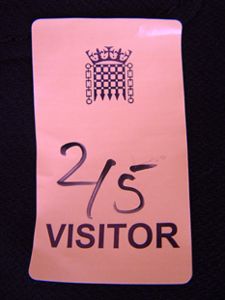We Come From Your Future: Dispatch Two 23 April 2008
Ultra-red

Day of Action to Abolish No Recourse to Public Funds
Field Composition Two: Abolish No Recourse
Organised by: Southall Black Sisters, Amnesty International UK, Oxfam (GB), National Women’s Aid (England), Imkaan, Newham Asian Women’s Project, Women’s Resource Centre, and Roshni (Sheffield).
Two hundred women from across the UK assemble at Victoria Embankment wearing white paper masks, black clothes and carrying banners that read: "Abolish No Recourse to Public Funds," "Violence or Destitution," "No Recourse, No Safety." The sound of cars passing through the rain, foghorns on the Thames and sirens in the distance offer a marked contrast to their silence as they pose for newspaper reporters.
Two hundred women in front of Westminster is a step in a long struggle undertaken by migrant women in the UK for recognition of the rights of those who have experienced abuse at home and at work. In 2002, the government altered immigration rules to enable women who had experienced domestic abuse to remain in the country. But the women who may have the ability to stay in the country have no access to public funds or benefits, making it near impossible to access shelters, refuges, social assistance or housing.
Women's organisations assembled at this spot demand that the "no recourse rule" be abolished in cases of domestic abuse altogether. Importantly, the no recourse campaign makes the same demand for migrant domestic workers.
"Making Migration Work for Britain" titles a proposed change to migration legislation. The idea is as simple as the slogan. Migrants shall work for Britain without ever arriving here: the status of domestic workers will change from worker, under which they are entitled to employment rights, visa renewal and the right to settle after five years, to business visitor, in which they will be denied the right to change employer, required to leave after six months and be offered no option for settlement.
Informal practices of immigration policing escort such measures. "Gateways," said one woman on the demo, "have been set up by some councils to centralise, screen and streamline access to services, detecting and denying those with insecure status any interface with government and sometimes non-governmental services." This same streamlining has been used to justify cuts to specialised migrant and anti-racist organisations.
At the demo, the in/out sentiment of migration policy measures is strangely dramatized by the revolving door of Portcullis House, (named after the chained gate used to symbolise the Houses of Parliament on letterheads and official documents), outside of which protestors line up, awaiting entry into the building that houses one third of Britain’s MPs. On entering the building, protestors are given a pink badge with the title 'Visitor' inscribed below the gate.
At this liminal spot in space and time, in which we await the opening of the revolving door and our moment to be heard, we wonder: How do the dynamics of public listening effect what we have to say? Through what passages of time have we come to occupy this place?
Once assembled inside, Members of Parliament of all three parties give speeches. A seated audience hears statements from women who tell their stories of domestic violence and the organizations that support them. These proclamations seem far from the experiences of self-support and organisation heard in the moments leading up to the meeting and in the coffee shop where many in attendance assembled later to debrief.
In these contexts we hear utterances of disbelief. As one organiser suggests: "Self-organised migrant groups have fought so long for mainstream recognition, but now the policies are slipping back and our very language is being used to justify our elimination."
We ask: What is the sound of representation?
Field Report Two by Ultra-red
Regularise Undocumented Workers
Dispatch ThreeMigrant Organising In The Rural South West
Dispatch FourNext Stop
Dipatch FiveSounding Alexandra Court
Dispatch SixEcho-mining at Deptford Market
Online EpisodesFollow this link for an introduction to the project by Ultra-red as well as links to all audio compositions and texts.
